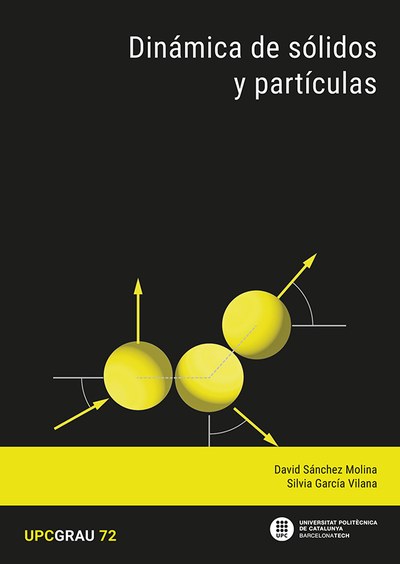Els Premis Sant Jordi Digital, volen ser un reconeixement a totes les autores i autors de la UPC que confien l’edició dels seus treballs a la pròpia institució.
Els Premis s’atorguen als llibres digitals publicats durant els dos anys anteriors i que han estat més descarregats al llarg de l’any anterior. Es tracta, doncs, d’un reconeixement als títols més utilitzats en diferents categories: llibres publicats a la col·lecció UPCGrau, llibres publicats a la col·lecció UPCPostgrau, llibres en català i llibres d’arquitectura.
Llibre digital més consultat de la col·lecció UPCGrau

David Sánchez Molina
Silvia García Vilana
Dinámica de sólidos y partículas es un texto de nivel universitario de dinámica clásica que usa un tratamiento matemáticamente riguroso, con énfasis en las generalizaciones. Cada capítulo tiene numerosos ejemplos prácticos y, al final de cada capítulo, se proporciona una lista de problemas para que el lector pueda autoevaluar su comprensión del contenido del capítulo. Además, se explican las limitaciones de la teoría clásica de la dinámica de sólidos, conectándolo con los desarrollos más modernos de las teorías físicas.
Llibre digital més consultat en català

Enric Xavier Martín Rull
Aquest llibre presenta nocions bàsiques sobre un llenguatge de programació, en aquest cas Python, combinats amb conceptes generals de programació i algorísmia. S’ha optat per aquest format perquè la programació és una matèria que de manera natural permet anar alternant els exercicis pràctics amb alguns conceptes teòrics o directament aplicar aprenentatge basat en problemes. El llenguatge Python s’ha anat fent popular com a alternativa lliure i gratuïta a altres plataformes de prova i desenvolupament, especialment en aplicacions científiques. Creat el 1991, és un llenguatge interpretat, dinàmic i multiplataforma. La seva facilitat d’ús i aprenentatge fa que també calgui posar el focus en com plantejar correctament els problemes per adquirir bons hàbits de programació.
Llibre digital més consultat d'arquitectura

Josep Muntañola (ed.)
The situation of humanity has entered a whirlwind of changes due to COVID, the evident climate change and the spectacular development of science in a digitalized and global world. Texts and technological advances are surpassed before they can be taught or disseminated. Nobody has time to read scientific advances, much less learn how to build them. The physical world space is connected every day with less physical time and mental time becomes more capable of symbolically reaching more virtual spaces. The threat of a catastrophic implosion between both space-times, the physical and the virtual, is greater every day. The danger of volatility increases day by day. If in the biblical Tower of Babel the condition for the physical survival of humanity was dispersion throughout an empty world, now the condition for survival is the opposite, we must unite in a world capable of communicating between languages to build a habitable earth in its entirety and not with towers of increasing height, as the Bible accuses. The biblical curse still stands, if we do not know how to react and each person continues to build their towers in their own way and according to their languages, either the climate, the war, the plagues, or a mixture of everything, will wipe out all of humanity.
 David Sánchez Molina
David Sánchez Molina  Enric Xavier Martín Rull
Enric Xavier Martín Rull Josep Muntañola (ed.)
Josep Muntañola (ed.)
Comparteix: